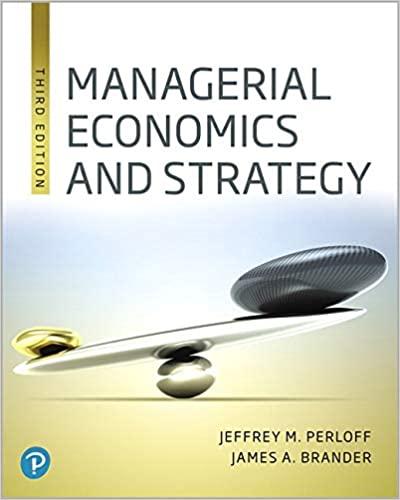Question
One great example of a firm that has clearly established significant power within a market would be the international search engine, Google. Google falls within
One great example of a firm that has clearly established significant power within a market would be the international search engine, Google. Google falls within the oligopoly market type because there are few sellers/competitors within this market. Google operates as a "natural monopoly" because it does not have to act strategically to eliminate the competition, it happens naturally (Thoma, 2014).
Washington DC software engineer Zack Maril reported that "the key to Google's dominance is not the fancy software or the ranking algorithms, but the sheer size of the index"(Purtill, 2021). I selected Google as my discussion topic because I researched what an index is and what algorithms mean exactly. In order to understand cost per click (CPC), I needed to understand how Google earned revenues and what each country is charged to use this search engine. I learned that many countries attempted to create their own search engines but failed because the cost was too high and playing catch up was unrealistic and impossible. This topic can be discussed on a much deeper context. "In 200, Google has an index of 1 billion pages, the largest in the world. Since then, it's grown to an estimated 600 billion pages" (Purtill, 2021). Compiling this size of index does cost a lot of money and Google spends hundreds of millions of dollars annually to maintain their indexes (Purtill, 2021). Recent reports show that currently Google has more than 90 per cent of the global search market, with Microsoft Bing its nearest rival at 2.7 per cent (Purtill, 2021).
I was interested in learning how Google obtained its money and found that Google has an average "cost per click" or CPC which is set in the U.S. at $2.32 and a 5:1 ratio according to Wordstream (Shewan, 2021). "In search, we know that users search for different things in different states and that average cost per click advertisers pay differs by state too" (Shewan, 2021). Monopolistic firms that exploit their market power or undertake strategic behaviors that make it more difficult for other companies to compete should come under careful watch, and when appropriate, receive penalties from regulators charged with promoting the public interest" (Thoma, 2014).
In October 2020, the U.S. Justice Department filed a lawsuit accusing Google of abusing its monopoly power (Purtill, 2021). The reason the lawsuit was filed was because of the annual amount Google allegedly paid Apple in 2018 to be the default search engine on all iPhones and other Apple products which was between $8 and $12 billions dollars (Purtill, 2021). From an economic perspective this has caused barriers for other firms to ever compete since Google originated allowing them to remain number 1 in the search engine market. "Google may also face new antitrust problems over Android mobile operating system, and it's not alone in facing tough antitrust scrutiny in Europe, Microsoft also having similar scrutiny" (Thomas, 2014). In was reported that Google has been negotiating with European regulatory authorities since 2010 in an attempt to settle an antitrust case concerning its search engine, and its third attempt to settle the case has been rejected (Thoma, 2014).
In conclusion, monopoly power cannot be prevented by regulating the firm's strategic behavior, the best course of action is to regulate the prices and quantities such a company can charge. Having governmental regulations and the U.S. Justice department has antitrust laws and regulations in place to monitor and audit firms who could cause negative externalities and not in public interest.
References:
Purtill, J. (2021). Building a search engine to rival Google could cost billions - and that's not the only problem. ACE Science.
https://www.abc.net.au/news/science/2021-02-14/google-news-media-bargaining-code-build-search-engine/13143582(Links to an external site.)
Shewan, D. (2021). How much does Google Ads Cost? Wordstream.
https://www.wordstream.com/blog/ws/2015/07/06/average-cost-per-click(Links to an external site.)
Thoma, M. (2014). What's so bad about monopoly power? CBS News. Moneywatch.
https://www.cbsnews.com/news/whats-so-bad-about-monopoly-power/
comment on:
Your own experiences with such firms or industries and their effect on you or your community.
Whether you agree or disagree with the above stance on regulation, explaining why. (Provide references please)
Step by Step Solution
There are 3 Steps involved in it
Step: 1

Get Instant Access to Expert-Tailored Solutions
See step-by-step solutions with expert insights and AI powered tools for academic success
Step: 2

Step: 3

Ace Your Homework with AI
Get the answers you need in no time with our AI-driven, step-by-step assistance
Get Started


